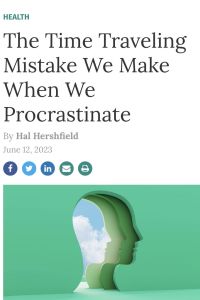Join getAbstract to access the summary!

Join getAbstract to access the summary!
Hal Hershfield
The Time Traveling Mistake We Make When We Procrastinate
Behavioral Scientist, 2023
What's inside?
To quit procrastinating, show some love for your future self.
Recommendation
Procrastinators of the world, unite…tomorrow! While you might not feel motivated to quit your tendency to stall, you shouldn’t put off taking action any longer. Research indicates that procrastination can have a devastating impact on your physical and mental well-being. UCLA School of Management professor Hal Hershfield explores what triggers procrastination and unveils an attribute common to procrastinators: an inability to imagine the future in vivid detail. If you’re guilty of procrastination, let Hershfield help you to empathize with your future self and kick the habit once and for all.
Summary
About the Author
Hal Hershfield is a UCLA School of Management professor of marketing, psychology and behavioral decision-making.

















Comment on this summary